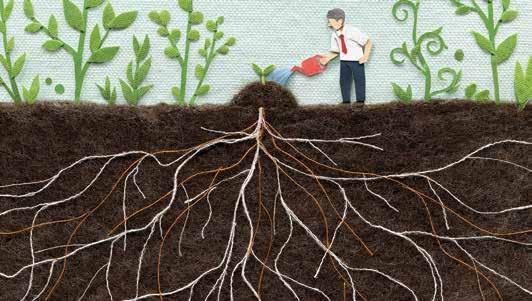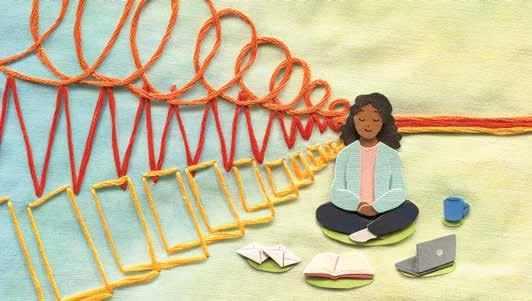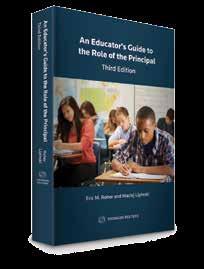
15 minute read
Year in Review
Moving forward after significant challenges
By Protective Services Team Illustration by Anthony Tremmaglia
Advertisement
At the time of the writing this article, OECTA and ETFO had reached tentative agreements. OSSTF was still in negotiations with the government. Schools were closed due to the pandemic with no confirmed date for return.
The 2019–20 school year has been heavily impacted by labour action. As a result, this has not been a typical year in Ontario, as labour action has meant that it is not “business as usual” in our schools. EQAO assessments have been cancelled, strikes have caused schools to be closed to students, extracurriculars have been impacted and administrators have been unable to work on school improvement planning with their staff. And then in March, these challenges were further heightened by the global pandemic in our communities and across the world.
It has been a taxing year, as principals and vice-principals have worked hard to maintain safe environments for students while the escalating job action has disrupted the school environment. This is part of labour relations; the push and pull of negotiations includes the strategy of employing job sanctions. But because of the legacy of a strong education system already in place before this year started, we have been able to deal with the challenges in part by relying on the strong relationships nurtured over many years. This year in particular, school administrators have demonstrated their collective ability to separate their staff relationships from the issues at hand. It is important that you continue to value your staff and recognize that labour action is part of working in a unionized environment.
Once new collective agreements are ratified, principals and viceprincipals will need to familiarize themselves with each employee group’s agreement and the implications of these various agreements at the school level. Each district OPC will need to advocate for school board training sessions that provide guidance regarding how to do that.
As provincial bargaining winds down, it is important to remember that the process has been exhausting for all parties. Union members have been obligated to follow the job sanctions prescribed by their union. The rising tension of following these directives, the anxiety of waiting for a resolution, the loss of wages and dealing with the public have all taken a toll on our staff members. It is difficult for them to stop doing work that they normally do. At the same time, principals and vice-principals have taken on work that we typically are not required to do. We have also had to deal with the reactions of students, parents and the public to labour disruption while continuing to support our school community. All of this leads to complexity and can affect professional relationships within a school.
To rebuild relationships with our staff, principals and vice-principals will need to consider the dynamics on our own team. Are there individuals who feel disillusioned with the process of labour action? Have some individuals alienated themselves from others? Are some team members showing signs of mental or physical strain? It is important for school leaders to recognize that at the end of job action, everyone
may not be able to “let go” of the situation and return to the pre-labour climate easily. Taking the time to restore individual relationships, as well as the dynamic of the entire school team, will be important.
In your role as school leader, consider how to help people repair these differences. At the time of writing this article, the COVID-19 virus is spreading throughout our communities and social distancing is very much the new norm. Typically, we would encourage you to initiate face-to-face contact with your staff. However, there are ways to connect virtually as well. Consider connecting through email, text messages and social media. Perhaps a group chatroom could be set up so that people are able to connect as a group and see how everyone is doing. Using a virtual platform such as Google Hangouts, FaceTime, Microsoft Teams and Zoom is another way to enhance communication within groups and help dispel that sense of isolation that many are feeling during this time of uncertainty.
Depending on the dynamics within your own school, it may be necessary to re-establish your relationship with your school’s union representative(s) and develop plans to implement the elements of the new collective agreements. Moving forward, you need to continue to consult and work with these representatives, to help rebuild the collaborative climate in the school and facilitate new initiatives.
In terms of community relationships, there is no doubt that families have been impacted by labour action. During this last round of negotiations, public opinion seemed to be quite supportive of the employee groups. However, others may not have been, and it will be important to help re-establish relationships our school community.

Tips for local districts
• Continue to meet with your senior staff, in person or virtually, to discuss issues that impact the work of prin cipals and vice-principals as labour unrest ends. • Advocate for training/resources for Members regarding the collective agreements and provide feedback to the senior staff about the type of training/resources needed. • Work towards having principal and/or vice-principal representation on committees that include board/school operations. Share with senior staff the benefits of having school leaders on these committees who report back to the local district. • Continue to reach out to local Members to understand issues that arise at the school level. • Continue to communicate with your PST District Support
Consultant.
• Read the new collective agreements and ask for clarifi cation from your Supervisory Officer and/or Human Resources regarding implementation of specific issues that arise. • Meet with the union representatives in your school to re-establish good communication, positive relationships and a schedule of regular check-ins. • Connect with your staff and draw out the things you share as a team. Encourage everyone to work in a climate of mutual respect as you work together to improve student outcomes. • Reach out to parents and communicate with them to help allay their concerns regarding the lost instructional time and their child’s progress. • Contact your School Council Chair and discuss the practicality of and plans for moving forward on any future initiatives and projects. • Share any concerns with your local OPC reps. • Monitor your own health and seek professional help from your Employee Assistance Program and/or Starling Minds as needed.
Think about ways to communicate positive messages to your school community about the work you, your staff and your students are doing. Look for ways to re-engage the parents and focus the community on how best to support the students within your school.
During negotiations, we have monitored our districts and their progress using our own check-in model by using Zoom meetings to gather feedback about local issues and to help problem-solve the concerns that were presented. The feedback from these meetings has been very positive, and it has established a weekly connection between our district support consultants and the local representatives. As we grappled with issues, it was important for local leaders from across the province to hear how other districts were handling various issues such as EQAO and report cards, and they are advocating locally for their colleagues.
It was gratifying to see solutions that were developed locally by one board being shared and used in other boards to help work through the situation in their own area. We appreciated the strong sense of partnership that emerged from these discussions and believe that this two-way communication between local OPC groups and their senior teams needs to continue. Although these weekly meetings were intended to provide additional support during labour action, the collaboration between local districts and PST District Support Consultants will continue to benefit our organization and our membership going forward.
To strengthen the relationship between senior teams and our local groups, it is important to acknowledge that the spirit of respect and cooperation that existed during this challenging time needs to become the new norm. What we experienced is characterized by Leithwood (2012; 2013) as “productive working relationships” (Ontario Leadership Framework). We know that as we move forward, we are going to continue to grapple with complex issues that require the same type of collective problem solving.
If classes resume before the school year closes, it is important to recognize that we cannot make up for all of the disruption to the school year in a shortened period of time, such as the school improvement planning process which has been impacted by both labour action and pandemic isolation. Rather, staff should spend their time reconnecting with students and restoring relationships with an aim to finishing the school year as positively as possible.
As the school year comes to a close, it is important to reflect on our own personal well-being and how we have managed the stress of When we (OPSOA) conceptualized the writing of this article, the focus was on “what happens next after labour unrest is over?” Then the pandemic hit and our school year changed significantly. The lessons learned during this time of challenge from both the labour unrest and from the COVID-19 pandemic will serve us well as we move forward. We are better together. School and system administrators have come together like never before to develop solutions to problems that meet systemic needs, as well as needs at the individual school level. This type of conversation needs to continue if we are to grow stronger as a school system. We have actively sought out opportunities to speak with one voice, to share the best of what we have to offer and to learn with and from one another. The trust that has been built has allowed individuals to ask for help, to offer a hand and to politely and professionally disagree and challenge the status quo. Labour unrest may cause some people to act in ways that we have never seen. And we’ve never been through anything like the COVID-19 pandemic. We cannot underestimate the effect that both of these challenges have had on all those with whom we work. Everyone has a story. We cannot be expected to know each story, each result or anticipate each reaction. We can, however, be present, be under standing and ask how we can help. We have always taken care of those we lead; it is time to ensure we take care of each other – to take care of the caregiv ers. Take time to check in on a colleague who may be a single administrator, one who may be finishing their career during these uncertain times, or even the boss! For some, both the labour situation and the COVID-19 pandemic have been traumatic events. Access the best learning out there about intervention and postvention strategies related to dealing with trauma. They will be invaluable resources as we move forward, returning to our new normal. Remember, you are not alone. Karen Edgar, the current President of OPSOA , is with the Thames Valley DSB.




When we (OPSOA) conceptualized the writing of this article, the focus was on “what happens next after labour unrest is over?” Then the pandemic hit and our school year changed significantly. The lessons learned during this time of challenge from both the labour unrest and from the COVID-19 pandemic will serve us well as we move forward. We are better together. School and system administrators have come together like never before to develop solutions to problems that meet systemic needs, as well as needs at the individual school level. This type of conversation needs to continue if we are to grow stronger as a school system.
We have actively sought out opportunities to speak with one voice, to share the best of what we have to offer and to learn with and from one another. The trust that has been built has allowed individuals to ask for help, to offer a hand and to politely and professionally disagree and challenge the status quo.
Labour unrest may cause some people to act in ways that we have never seen. And we’ve never been through anything like the COVID-19 pandemic. We cannot underestimate the effect that both of these challenges have had on all those with whom we work. Everyone has a story. We cannot be expected to know each story, each result or anticipate each reaction. We can, however, be present, be understanding and ask how we can help. We have always taken care of those we lead; it is time to ensure we take care of each other – to take care of the caregivers. Take time to check in on a colleague who may be a single administrator, one who may be finishing their career during these uncertain times, or even the boss!
Remember, you are not alone. Karen Edgar, the current President of OPSOA , is with the Thames Valley DSB. • Continue to meet with your senior staff, in person or virtually, to discuss issues that impact the work of principals and vice-principals as labour unrest ends. • Advocate for training/resources for Members regarding the collective agreements and provide feedback to the senior staff about the type of training/resources needed. • Work towards having principal and/or vice-principal representation on committees that include board/school operations. Share with senior staff the benefits of having school leaders on these committees who report back to the local district. • Continue to reach out to local Members to understand issues that arise at the school level. • Continue to communicate with your PST District Support Consultant.
Sidebar: Tips for principals and vice-principals in schools. • Read the new collective agreements and ask for clarification from your Supervisory Officer and/or Human Resources regarding implementation of specific issues that arise. • Meet with the union representatives in your school to re-establish good communication, positive relationships and a schedule of regular check-ins. • Connect with your staff and draw out the things you share as a team. Encourage everyone to work in a climate of mutual respect as you work together to improve student outcomes. • Reach out to parents and communicate with them to help allay their concerns regarding the lost instructional time and their child’s progress. • Contact your School Council Chair and discuss the practicality of and plans for moving forward on any future initiatives and projects. • Share any concerns with your local OPC reps. • Monitor your own health and seek professional help from your
CANFAR.COM/ORDER jointphdined.org APPLY BY NOVEMBER 15, 2020
Taking the time to restore individual relationships, as well as the dynamic of the entire school team, will be important. Think about ways to communicate positive messages to your school community about the work you, your staff and your students are doing. Look for ways to re-engage the parents and focus the community on how best to support the students within your school.
During negotiations, we have monitored our districts and their progress using our own check-in model by using Zoom meetings to gather feedback about local issues and to help problem-solve the concerns that were presented. The feedback from these meetings has been very positive, and it has established a weekly connection between our district support consultants and the local representatives. As we grappled with issues, it was important for local leaders from across the province to hear how other districts were handling various issues such as EQAO and report cards, and they are advocating locally for their colleagues.
It was gratifying to see solutions that were developed locally by one board being shared and used in other boards to help work through the situation in their own area. We appreciated the strong sense of partnership that emerged from these discussions and believe that this two-way communication between local OPC groups and their senior teams needs to continue. Although these weekly meetings were intended to provide additional support during labour action, the collaboration between local districts and PST District Support Consultants will continue to benefit our organization and our membership going forward.
To strengthen the relationship between senior teams and our local groups, it is important to acknowledge that the spirit of respect and cooperation that existed during this challenging time needs to become the new norm. What we experienced is characterized by Leithwood (2012; 2013) as “productive working relationships” (Ontario Leadership Framework). We know that as we move forward, we are going to continue to grapple with complex issues that require the same type of collective problem solving.
If classes resume before the school year closes, it is important to recognize that we cannot make up for all of the disruption to the school year in a shortened period of time, such as the school improvement planning process which has been impacted by both labour action and pandemic isolation. Rather, staff should spend their time reconnecting with students and restoring relationships with an aim to finishing the school year as positively as possible.
As the school year comes to a close, it is important to reflect on our own personal wellbeing and how we have managed the stress of roles during the past year. It has been a lonely time for many, as labour action halted the collaborative team activities that many of you find so rewarding. Taking stock of our own personal health and finding the time to use the resources we need to stay healthy is important as we head into the summer months.
As we reflect on the 2019–20 school year, let’s shift the conversation from the differences that may have separated us to the similarities that we share. Revisit our common goal of helping students realize their potential, both academically and with respect to their well-being. With the year that has been, it is even more imperative that we work together to help stabilize and support our student communities. asayed@principals.ca
RESOURCES RELATED TO TRAUMA/TRAUMATIC EVENTS
• School Mental Health Ontario • North American Center for Threat Assessment and Trauma Response • Ontario Principals’ Council









